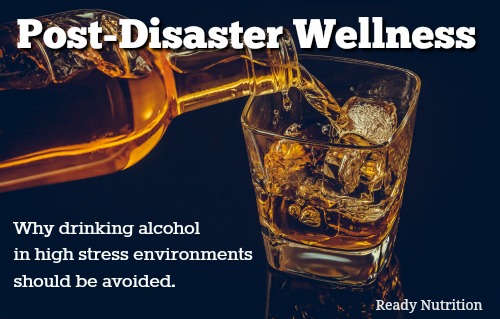
(Sign up for our FREE newsletter to get the latest prepping advice, gardening secrets, homesteading tips and more delivered straight to your inbox!)
You, the readers are a very demographically-diverse group from all walks of life and all ages, some with special health care needs. I implore all of you to analyze your status and with your doctor come up with an exercise program for yourself.
Physical training and exercise are your best tools for preparation, along with proper study, diet, and rest.
Why You Should Avoid Drinking Alcohol in High Stress Environments
That being said, why am I writing about alcohol affecting training? I do so because the proverbial “two drinks,” as well as the “after dinner drink,” and the “after work drink” are pervasive in our society and culture. The Super Bowl just finished up, with hardly anything in the ads for your physical training, but a barrage from Budweiser to drink beer. Consider me a quiet voice on the sideline, little more than a whisper in your ear recommending the physical training.
Alcohol deposits fat in your midsection, and also has a wasting effect on the thigh and gluteal muscles. There was a study in 2000 done published in the Journal of Applied Physiology that found cortisol (a hormone we discussed in previous articles) rose 61% when alcohol was consumed after strenuous physical activity. The reason for this significance: many people have physically-demanding jobs and wish to “wind down” with a beer or two, or a shot after work.
The cortisol (usually produced with stress) has an adverse effect on muscle maintenance and muscle growth. See, alcohol has an effect that has gravitated man toward it throughout history: it holds similar effects to the drug Valium (or Diazepam, if you prefer) with calming, anxiety-relieving effects. It also releases dopamine and endorphins within the first 20 minutes of consumption, substances that enhance pleasure when released by the brain…and in this effect, alcohol is almost akin to opium.
With low doses, alcohol increases stimulation in certain brain areas and the central nervous system, leading to feelings of euphoria. So, with all of this, you may be thinking…shouldn’t I be taking an occasional drink of alcohol in conjunction with training? The answer is an unequivocal “No!” on all counts.
Alcohol has the ability to severely depress brain function by interfering with the ion channels needed to fire neurons…that is, allow your brain to communicate to and with other important parts of your body…such as respiration, heart, motor control, and so forth. Far from being a “sleep aid,” it can rob you of REM. No, not the band from the late 80’s to early 90’s…but Rapid-Eye Movement sleep. Alcohol can hurt your sleeping habits. To say nothing of your love life.
Chronic consumption of alcohol is a libido-killer in both men and women. It seriously lowers testosterone levels in men, and causes the testicles to shrink, as well as promoting impotence. If you read the article I recently wrote for men on the importance of maintaining healthy levels of testosterone with weight and physical training, you’ll understand just how negative these alcohol-induced reductions are.
Alcohol increases the amount of recovery time that you need to heal and restore your muscles after hard physical labor or exercise. Your liver works hard to excrete the alcohol and the toxins associated with it. A substantial amount of energy is also needed to break down the molecules and process them. If you work out for an hour in the gym and then go and have a beer or a glass of wine, you have just ruined or severely cramped the gains you may have experienced.
Tissue repair and the uptake of amino acids are also severely hampered by alcohol consumption. Studies in the past have shown that a glass of wine will lower the triglycerides in the bloodstream and help prevent blood clotting. This is true, but guess what? So will a regular exercise program! You can lower those triglycerides and build yourself up! Alcohol also tends to reduce the uptake of essential vitamins and minerals, such as Vitamin C and calcium with long-term consumption.
Will it kill you or cripple you to have a drink every now and then, such as once a month? Consult with your doctor first, but it probably will not harm you. I still stand by the fact that you don’t really need it, and it can cause your training and physical fitness regimen to suffer. I haven’t even mentioned the other negative effects that heavy drinking can cause, but you can figure them out if you haven’t experienced them yourself.
To summarize, alcohol has its uses and is not a “villain,” and neither are people who consume it responsibly villains. Just keep in mind that this piece is not designed to “excoriate” alcohol, but to keep you informed of the negative effects it can have on your physical fitness training when it is consumed. Feel stressed? Put on the bag gloves and beat up the heavy bag for ten or fifteen minutes. If you still feel that you need a drink, well, then down a big shake full of amino acids…that’ll serve you better! Stay healthy, make gains, and keep in that good fight! JJ out!
